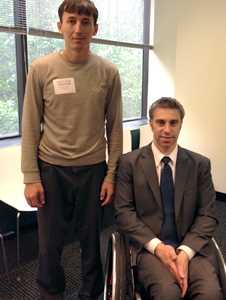ivlp-commissioner-calise.jpg
 Ibragim Nurjanov and his IVLP group meet with Commissioner Victor Calise of New York City's Office for People with Disabilities (MOPD)
Ibragim Nurjanov and his IVLP group meet with Commissioner Victor Calise of New York City's Office for People with Disabilities (MOPD)
During his IVLP throughout the United States, Ibragim participated in meetings and activities to better understand how Americans accommodate people with disabilities. For example, he observed the similarities between how Turkmenistan and the United States approach the para-Olympic games, as well as how they accommodate people with disabilities. And he also observed differences, such as how the United States public schools make noticeable efforts to accommodate students with disabilities.
“I really enjoyed the professional appointments in the U.S., especially the meeting in a Brooklyn Public Schools, where I observed an ‘inclusive model’ of education: 17 non-disabled students and eight students with different disabilities were all learning together in one classroom,” he says. “I was also impressed that the school provides all the support a student with disabilities needs: wheelchair access and so on.”
As he travelled, Ibragim had the assistance of an interpreter, since English is not a requirement to be chosen as an IVLP participant. However, he noted that navigating the United States without knowing English can be as much of a challenge as some disabilities.
“I think that this country has accommodation for all types of people, but it is very important for a person who wishes to come to the United States to know some English. You should not be surprised if a stranger, someone in the street, should greet you or smile at you. But it helps to know English, just to be able to get yourself a bottle of water on your own,” he says.
The program connected Ibragim to policies in the United States and people. Ibragim, who has a prosthetic but does not like to focus on it, made a connection with New York City staff at Achilles International, who invited him to participate in a running event for disabled athletes. And in Eugene, Oregon, one of the organizations helping athletes with disabilities offered to be part of an exchange with Turkmenistan.
“The meetings were all very good and informative. It was a very busy program, but I liked that we had time for leisure and cultural activities as well. I saw a great deal of the country, its regional, structural, cultural and climatic diversity,” he says.



